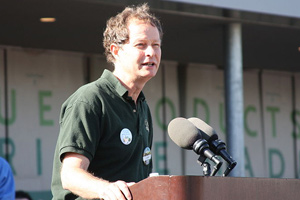
Whole Foods Market
In 1978, John Mackey and his girlfriend used $45,000 in seed money to start “Safer Way,” a natural-foods store in Austin, Texas, that was supposed to offer shoppers an alternative to “evil” profit-seeking corporations. But soon the long-haired 25-year-old found himself lumped in with the people he was supposed to be fighting. His customers complained that his prices were too high. His workers thought they weren’t being paid enough. Austin nonprofits said he should give them more money. And government regulators were slapping him with fees, fines, and taxes. He lost more than half of his investment before renaming the store Whole Foods and reconsidering his take on corporate America. “My worldview underwent a massive shift,” he writes in Conscious Capitalism, a new book about his business philosophy that Mackey coauthored with Raj Sisodia, cofounder of the nonprofit Conscious Capitalism, Inc. “I had become a businessperson and a capitalist, and I had discovered that business and capitalism, while not perfect, were both fundamentally good and ethical.” (A book review is forthcoming.)
Mackey responded via email to my questions, dishing on Obamacare, the relevance of labor unions, and the overheated rhetoric concerning climate change—which is, after all “perfectly natural.”
Mother Jones: You run Whole Foods Market as a liberal might—with generous wages and worker benefits and progressive environmental policies. Yet when it comes to politics, you are essentially a libertarian.
John Mackey: I reject the premise that liberal and libertarian values are necessarily in conflict. In fact, I often self-identify as a “classical liberal.” I am pro-choice, favor legalizing gay marriages, protecting our environment, enforcing strict animal welfare protection laws (I’ve been an ethical vegan for 10 years), marijuana legalization, having a welfare safety net for our poorest or disabled citizens, and a radically reduced defense budget and military presence around the world. However, I’m also a conscious capitalist—I believe economic freedom and entrepreneurship are the best ways to end poverty, increase prosperity, and evolve humanity upward. I believe that all forms of socialism have been proven over time to result in a loss of both economic and civil liberties, with increasing poverty. The truth is that I don’t fit into a simple ideological box. I read widely on issues, try to think carefully about them, and then I make up my own mind.
MJ: Is Whole Foods’ success really a model for anything besides businesses that cater to a sustainability niche?
JM: Many conscious businesses with similar business practices are primarily low-price oriented, such as Southwest Airlines, Costco, and Amazon. I believe our philosophy of conscious capitalism will eventually be widely adopted primarily because it is a better way to do business, and it creates more total value in the world for all of its stakeholders.
MJ: I don’t see how Amazon is a “conscious business,” when much of its competitive advantage derives from evading state and local sales taxes and using low-wage temp workers in its warehouses.
JM: Amazon is certainly not a perfect company. However, doctors, teachers, engineers, journalists, politicians, and labor unions are also on a continuum of consciousness and none are perfect either. It is easy to judge and find fault with any company if that is what one’s ideological biases wish to see. What is much harder to do is to see a company’s actions in the full context of the total value in the world that they are creating. I have no doubt that Amazon is creating great value for its millions of customers, employees, suppliers, investors, and communities—who all are trading with the business voluntarily for mutual benefit—and that they are overall contributing greatly to making the world a better place.
MJ: Is it realistic to expect that companies like Walmart will adopt more progressive practices without outside pressure from the government or labor unions?
JM: I believe that Walmart has made a strong effort to improve its environmental impacts, and those efforts are probably not being motivated by either the government or labor unions. If they can change their environmental practices for the better, then I believe they are capable of changing their other practices too.
MJ: Yet many news outlets, including The Atlantic and Mother Jones, have reported that Walmart has pulled back from its sustainability programs—except for the ones that save it money. Do you really believe that Walmart could change fast enough on its own to help the global environment?
JM: The points we make about Walmart in our book were given as examples of a very large, traditional company making progress in lessening its negative environmental impact. Such efforts should be encouraged. However, we agree with you that Walmart’s evolution needs to continue—just like everyone else’s.
MJ: Walmart calls its workers “associates.” You call them “team members.” Why not just say “workers”?
JM: We believe that the term “team members” more accurately reflects the reality at Whole Foods Market. Our company is organized into thousands of self-managing, interlocking teams, from entry level positions all the way up to the most senior levels. Everyone hired into our stores is hired on a provisional basis on a team for 30 to 90 days until they are voted on by their fellow team members. It requires a positive two-thirds vote to achieve actual “team member” status and to begin receiving full benefits. Team members is exactly what they are.
MJ: Harvard sociology professor Bruce Western has found that the decline in unions in recent decades accounts for a full one-third of the growth in income inequality for male workers. You argue in your book that unions have become less relevant. Can workers really rely on the beneficence of CEOs?
JM: I haven’t read this particular article so I don’t feel that I can comment on it. However, I’m not opposed to the existence of labor unions, which have served important historical purposes. Certainly, employees should have the legal right to choose union representation. At the same time, employees shouldn’t be coerced to join unions or pay union dues against their will. They should also have the legal right to not join unions, and unfortunately in many states this legal right doesn’t exist. Labor unions served a very important function when the industrial revolution was kicking into high gear to protect employees from arbitrary abuses of power and exploitation and they helped create many important legal protections. However, today our overall economy is much less of an industrial economy and much more of an information and services economy that depends upon high levels of knowledge, teamwork, and cooperation. Today most employees feel that unions are not necessary to represent them—evidenced by the fact that private-sector union membership has steadily fallen from 36 percent of the work force to only 6.9 percent. Whether the future will be better for the middle class with or without unions I cannot say. However, I do believe private sector unions need to evolve away from their adversarial tactics, and their anti-business attitude and rhetoric, if they wish to remain relevant.
MJ: The New Republic‘s Timothy Noah will tell you that the demise of unions has more to do with the Taft-Hartley law, which gave employers a lot of tools to undo the advances made in the 1930s.
JM: I disagree. I believe the Taft-Hartley law created a more level playing field between unions and managers, which had tilted much too heavily toward unions with the Wagner Act. The truth that the labor union movement is very resistant to seeing is that the industries that have been the most heavily unionized in the United States have all been in decline and do not compete well internationally—automobiles, steel, airlines, conventional supermarket chains, and most unionized manufacturing. Millions and millions of jobs have been permanently lost in these industries. Why is that? The labor movement would be well served to rethink its tactics and mindset, which cause great damage to the businesses which ultimately employ the unionized workers.?
MJ: Kim Fellner, author of the book Wrestling With Starbucks, describes Starbucks’ and Whole Foods’ approach to workers as “the essence of benevolent paternalism.” She once told me: “These are companies that want to do good by their workers, but want to decide what that good is, rather than letting the workers decide for themselves. And that’s a problem.” What’s your response to this critique?
JM: I don’t agree at all. We are a highly decentralized company. We are organized into self-managing work teams which are empowered to make decisions regarding the composition of their team, product selection, merchandising, continuous training and education, and many other things. Each team is collectively rewarded based on their labor productivity every four weeks with bonuses being distributed equally on a per-hour-worked calculation. Our team members across the entire company collectively vote on their benefits package every three years, and everyone from entry-level team members all the way up to the co-CEO’s receive the exact same benefit package. Whole Foods is continually striving to empower our team members more and to help them self-actualize. That requires autonomy, creativity, and the opportunity to achieve mastery—all of which are inconsistent with paternalism.
MJ: You are known to be a bit of a climate change skeptic. In your book you write that “some scientists estimate that the United States now absorbs as much carbon emissions as it emits.” Your source is a paper by the American Enterprise Institute, which has received funding from the Koch brothers and ExxonMobil. Do you really consider AEI a credible source?
JM: I believe that it is very important to read a variety of viewpoints, including those outside of our own ideological biases. Regarding carbon sequestration, you might want to look at the research by Fan and Gloor (Science, vol. 282: pp 442-446 [subscription required]). This study indicated that the forested region in North America between 15 and 51 degrees north latitude was calculated to have a carbon sink that can annually remove CO2 from the air equal to all the carbon produced from fossil fuel consumption in both the United States and Canada.
Contrary to what has been written about me, I am not a “climate change skeptic.” Climate change is clearly occurring, and based on what I have read global temperatures have increased about 1.5 degrees Celsius over the past 150 years. We’ve been in a gradual warming trend since the ending of the “Little Ice Age” in about 1870, and climate change is perfectly natural and not necessarily bad. In general, most of humanity tends to flourish more when global temperatures are in a warming trend and I believe we will be able to successfully adapt to gradually rising temperatures. What I am opposed to is trying to stop virtually all economic progress because of the fear of climate change. I would hate to see billions of people condemned to remain in poverty because of climate change fears.
MJ: So do you think the climate change law that passed the House in 2009 and stalled in the Senate went too far?
JM: Yes, I believe that it did.
MJ: Do you still think Whole Foods’ model for medical care is a viable alternative to Obamacare?
JM: Whole Foods Market has an excellent health care plan which is very popular with our team members. I don’t think Whole Foods’ model is a complete solution to our health care problems in the United States, but it could serve as part of the solution. While I would personally prefer a completely free market in health care, I recognize that isn’t politically possible at this time. Therefore, my favorite national solution is to copy what Switzerland is doing. They have achieved universal coverage while keeping their health insurance market private and competitive, and subsidizing the cost of health insurance for their less affluent citizens. Given a choice of competitive private plans, more than 50 percent of Swiss citizens choose a high-deductible plan similar to what Whole Foods offers. I believe the Swiss health care system is far superior to what we are now creating under health care reform, and I would urge our political leaders to move toward a similar model.
MJ: I don’t understand why you prefer free-market health care system. Just look at the experience of Whole Foods. In 2010, well before the Affordable Care Act went into effect, you told your employees that the cost of Whole Foods’ plan as a percentage of sales had increased by 60 percent in seven years. That’s a staggering increase.
JM: Your assumption is that the United States had a free-market health care system back then. It did not. The health care system, even prior to “reform,” was one of the most highly regulated sectors in our economy, and it lacked both meaningful competition or a functional price system. I believe we need to radically deregulate our system to let markets, innovation, and competition work effectively, while creating a strong safety net. I believe free-enterprise capitalism works much, much better than either socialism or some type of fascism where government controls and directs business—which is where I believe we are headed now. ?
MJ: How should we fix America’s budget crisis?
JM: The deficit problems can be completely explained by too much governmental spending. Spending at all levels has significantly increased in the past 12 years under both presidents, Bush and Obama. We could bring the annual federal budget into the black within just 10 years by simply limiting increases in spending to 2 percent per year. No additional taxes are required and I believe taxes are already too high in the United States. For example, our corporate income taxes are already the highest in the world.
MJ: That’s a fairly radical position when you consider that the United States ranks behind just about every other industrialized country in per-capita government spending. Subtract the obscene sums that we spend on our military, and we’re a libertarian paradise.
JM: What I said about eliminating the deficit within 10 years is true—see [this analysis]. I also don’t believe my position on governmental spending is radical at all. You are comparing the United States to Europe today in per-capita spending and Europe is declining even faster than the United States is currently declining. They are not the appropriate model to compare against. A better comparison is to compare our current per-capita spending to what the United States has historically spent, when our country was growing the fastest and prosperity was rapidly increasing throughout the society. At the turn of the 20th century governmental spending was only 7 percent of GDP. Now we are spending 40 percent, the highest it has ever been with the exception of World War II. (See this for a quick overview.) One thing we do agree on is that the we spend way too much money on the military. I believe that our government should stop trying to police the world and that it could protect the American people for a small fraction of the money that we spend today.
MJ: Compared with other CEOs, you have, to your credit, been very transparent about your views on business and politics. Why don’t more business leaders speak their minds openly instead of hiding behind front groups?
JM: I’m an enthusiastic proponent of the First Amendment. I believe in a vibrant democracy that encourages freedom of speech. I therefore believe business leaders should speak out openly when they believe it is appropriate to do so. Unfortunately most do not, for fear of attacks by the media and by various pressure groups and special interests. These attacks create a “chilling effect” that I believe is harmful to the greater good. I very much believe in creating organizations and societies that are based upon transparency, honesty, authenticity, caring, innovation, and collaboration. Our planetary resources may be limited, but our human creativity is limitless.


















